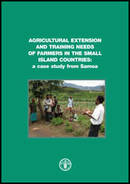Publications
The rural people in developing countries are often far removed from many important decision-making processes. Production and consumption of genetically modified organisms (GMOs) is a topical issue and could impact on socio-cultural systems of rural populations in developing countries. Involving the rural people in decision-making on GMOs was discussed during this moderated e-mail conference hosted by the FAO Biotechnology Forum in 2005.
The geographical location of farmers is one of the factors under consideration when strategies for client-oriented agricultural extension approaches are being outlined. A large number of men and women are engaged in farming in thousands of small, medium and large islands, and they need extension advice according to their unique situation. FAO has conducted several studies to identify extension and training needs of farmers living in different geographical locations such as mountains, desert and small islands. This publication is based on a study that was conducted in the island country of Samoa, located in the Pacific Ocean.
All walnut species of the genus Juglans are trees or large shrubs having shoots with chambered piths, large aromatic compound leaves, staminate catkins on one-year-old wood and female flowers on the top of the current year's twigs. The husked fruit is a false drupe containing a large woody-shelled nut. All Juglans produce edible nuts, although size and extrability differ considerably. Most species are highly regarded for their timber. The genus Juglans consists of approximately 20 species grouped taxonomically into four sections: Rhysocaryon, Cardiocaryon, and Trachycaryon, Dioscaryon.
The FAO concept of Sustainable Agriculture and Rural Development (SARD) was one of a number of concepts that crystallized during the 1980s. The importance of the SARD concept1 was recognized and confirmed at the United Nations Conference on Environment and Development (UNCED), Rio de Janeiro, 3-14 June 1992, with Chapter 14 of Agenda 21 setting out the programmes and specific actions needed to promote sustainable agriculture and rural development. In the years since the UNCED Conference, the concept of SARD has evolved to include social, institutional and economic sustainability, as well as environmental sustainability.
The Research and Technology group is pleased to announce publication of the summary document of the FAO e-mail conference "Molecular marker assisted selection as a potential tool for genetic improvement of crops, forest trees, livestock and fish in developing countries". This 10-page document aims to provide an easy-readable synopsis of the main issues and concerns discussed by participants during this moderated e-mail conference, hosted by the FAO Biotechnology Forum from 17 November to 14 December 2003. During the 4-week conference, 85 messages were posted, about 60% coming from people living in developing countries.



